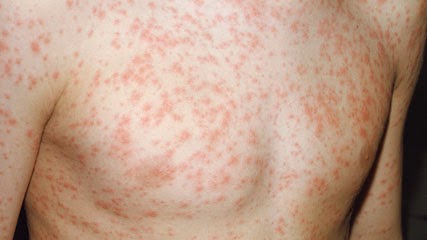What's in this article?
Rubella is commonly German measles or 3-day measles is an infection that primarily affects the skin and lymph nodes. It is caused by the rubella virus (not the same virus that causes measles), which is usually transmitted by droplets from the nose or throat that others breathe in. It can also pass through a pregnant woman’s bloodstream to infect her unborn child.
.jpg)
This disease is often mild and attacks often pass unnoticed. The disease can last one to three days. Children recover more quickly than adults. Infection of the mother by rubella virus during pregnancy can be serious, if the mother is infected within the first 20 weeks of pregnancy, the child may be born with congenital rubella syndrome (CRS), which entails a range of serious incurable illnesses. Miscarriage occurs in up to 20% of cases.
Rubella infection, or German measles, is a generally mild disease in kids that can be prevented with vaccination. Its primary medical danger is to pregnant Although it most commonly occurs in young children.
What are the symptoms of rubella?
Rash and fever for two to three days (mild disease in children and young adults).
Rubella infection may begin with 1-2 days of mild fever (99-100°F, 37.2-37.8°C) and swollen, tender lymph nodes, usually in the back of the neck or behind the ears. A rash then begins on the face and spreads downward. As it spreads, it usually clears on the face.
 The rubella rash is often the first sign of illness that a parent notices. It can look like many other viral rashes, appearing as either pink or light red spots, which may merge to form evenly colored patches. The rash can itch and lasts up to 3 days. As the rash clears, the affected skin might shed in very fine flakes.
The rubella rash is often the first sign of illness that a parent notices. It can look like many other viral rashes, appearing as either pink or light red spots, which may merge to form evenly colored patches. The rash can itch and lasts up to 3 days. As the rash clears, the affected skin might shed in very fine flakes.
Other symptoms of rubella (these are more common in teens and adults) can include headache, loss of appetite, mild conjunctivitis(inflammation of the lining of the eyelids and eyeballs), a stuffy or runny nose, swollen lymph nodes in other parts of the body, and pain and swelling in the joints (especially in young women). Many people with rubella have few or no symptoms.
Rubella in a pregnant woman can cause congenital rubella syndrome, with potentially devastating consequences for the developing fetus. Children who are infected with rubella before birth are at risk for growth problems; intellectual disability; defects of the heart and eyes; deafness; and liver, spleen, and bone marrow problems.
What are the complications of rubella?
Birth defects if acquired by a pregnant woman: deafness, cataracts, heart defects, mental retardation, and liver and spleen damage (at least a 20% chance of damage to the fetus if a woman is infected early in pregnancy).
Rubella and Pregnancy
The main time rubella becomes a serious concern is if a pregnant woman catches the infection during the first 20 weeks of her pregnancy.
This is because the rubella virus can disrupt the development of the baby and cause a wide range of health problems, including:
- eye problems such as cataracts (cloudy patches on the lens of the eye)
- deafness
- heart abnormalities
- brain damage
The birth defects caused by the rubella virus are known as congenital rubella syndrome (CRS).
Since the introduction of the mumps, measles and rubella (MMR) vaccine, CRS is now very rare in the UK.
Does my child need this vaccine?
Children should get 2 doses of MMR vaccine:
- The first dose at 12-15 months of age
- The second dose at 4-6 years of age
These are the recommended ages. But children can get the second dose at any age, as long as it is at least 28 days after the first dose.
Treatment of rubella
Rubella cannot be treated with antibiotics because they do not work against viral infections. Unless there are complications, rubella will resolve on its own.
Any pregnant woman who has been exposed to rubella should contact her obstetrician immediately.
Rubella is typically mild in kids, who often can be cared for at home. Monitor your child’s temperature and call the doctor if the fever climbs too high.
To relieve minor discomfort, you can give your child acetaminophen or ibuprofen. Do not give aspirin to a child with a viral illness because such use has been associated with the development of Reye syndrome, which can lead to liver failure and death.






